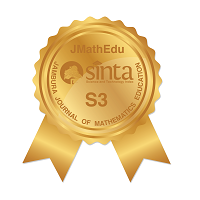Pengaruh Model Pembelajaran Learning Cycle dan Penalaran Formal terhadap Hasil Belajar Matematika
Abstract
This article discusses the effect of the Learning Cycle model on mathematics learning outcomes in terms of formal reasoning. The study was conducted in the form of experiments involving students of SMP Negeri 1 Tibawa, Gorontalo. Data on mathematics learning outcomes and formal reasoning are obtained using multiple-choice tests that meet the item validity and instrument reliability requirements. Data analysis used a two-way analysis of variance and the Tuckey Test. Hypothesis testing is performed at a significant level of 0.05. The results showed that the learning outcomes of students who were taught using the Learning Cycle model were higher than the learning outcomes of students who were taught using the direct learning model in terms of formal reasoning. This result is strengthened by the existence of a significant interaction between learning models and formal reasoning towards mathematics learning outcomes. Student learning outcomes with high formal reasoning levels, get better learning outcomes in learning with the Learning Cycle model compared to students with low formal reasoning levels.
Keywords
Full Text:
PDFReferences
C. Magelo, E. Hulukati, and I. Djakaria, "Pengaruh Model Pembelajaran Open Ended terhadap Kemampuan Berpikir Kreatif Matematik Ditinjau dari Motivasi Belajar" Jambura J. Math., vol. 2, no. 1, pp. 15-21, 2020.
V. Damopolii, N. Bito, and R. Resmawan, "Efektivitas Media Pembelajaran Berbasis Multimedia pada Materi Segiempat" Algoritm. J. Math. Educ., vol. 1, no. 2, pp. 74-85, 2019.
E. Hulukati, "Mengembangkan kemampuan komunikasi dan pemecahan masalah matematika siswa SMP melalui model pembelajaran generatif" Universitas Pendidikan Indonesia, 2005.
R. Resmawan, "Hubungan antara Pesepsi Mahasiswa terhadap Keterampilan Dosen dalam Mengelola Kelas dengan Hasil Belajar Mahasiswa Jurusan Pendidikan Matematika" J. Euler, vol. 2, no. 2, pp. 129-134, 2014.
N. A. Yunus, E. Hulukati, and I. Djakaria, "Pengaruh Pendekatan Kontekstual Terhadap Kemampuan Penalaran Matematis Ditinjau dari Gaya Kognitif Peserta Didik" Jambura J. Math., vol. 2, no. 1, pp. 30-38, 2020.
Trianto, Model Pembelajaran Inovatif Berorientasi Konstruktifistik. Jakarta: Prestasi Pustaka, 2011.
L. W. Trowbridge and R. W. Bybee, Teaching Secondary School Science: Strategies for Developing Scientific Literacy. New York: Pearson Prentice Hall, 1996.
F. Fajaroh and I. W. Dasna, Model-Model Pembelajaran Inovatif:
Pembelajaran dengan Model Siklus Belajar (Learning Cycle). Malang: UM Press, 2007.
M. Kholik, Metode Pembelajaran Konvensional. Bandung: Rieneka Cipta, 2011.
DOI: https://doi.org/10.34312/jmathedu.v1i1.4557
Refbacks
- There are currently no refbacks.
Copyright (c) 2020 Jambura Journal of Mathematics Education (JMathEdu)

This work is licensed under a Creative Commons Attribution-NonCommercial 4.0 International License.
Jambura Journal of Mathematics Education has been indexed by:
EDITORIAL OFFICE OF JAMBURA JOURNAL OF MATHEMATICS EDUCATION |
 | Department of Mathematics, Universitas Negeri Gorontalo Jl. Prof. Dr. Ing. B. J. Habibie, Moutong, Tilongkabila, Kabupaten Bone Bolango, Gorontalo 96554, Indonesia |
 | Email: [email protected] |
 | +6285255745923 (Call/SMS/WA) |
 | Jambura Journal of Mathematics Education (JMathEdu | eISSN: 2721-7477) by Department of Mathematics Universitas Negeri Gorontalo is licensed under a Creative Commons Attribution-NonCommercial 4.0 International License. Powered by Public Knowledge Project OJS. |



















